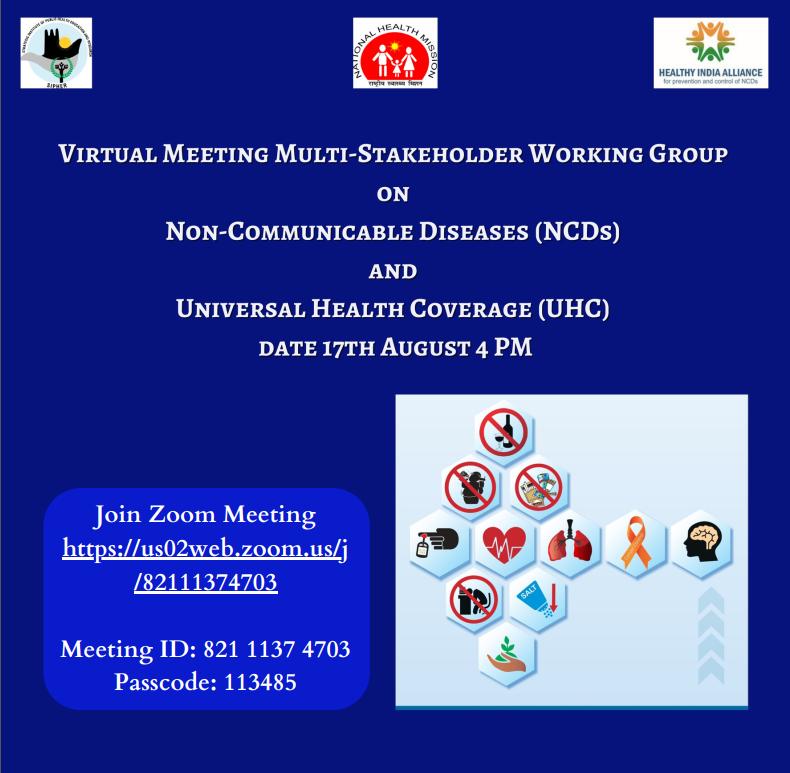Chandigarh 18 August: A consultation of the Multi-Stakeholder Working Group on Non-Communicable Diseases (NCDs) and Universal Health Coverage (UHC) was held virtually. It aimed to provide a unified platform for multiple stakeholders, including People Living with Non- Communicable Diseases (PLWNCDs); Government representatives; Civil Society Organisations; Medical Fraternity and educational institutes to engage in discussions and deliberations related to community action for NCD prevention and treatment. It was Organised by the Healthy India Alliance, HRIDAY and Strategic Institute for Public Health Education and Research (SIPHER).
Introducing the topic of consultation Dr Rakesh Gupta President, SIPHER said that, this consultation aimed to engage all stakeholders in discussions and deliberations related to community action for NCD prevention and treatment. He added that in India, nearly 5.8 million die from NCDs (heart and lung diseases, stroke, cancer and diabetes) i.e., one in four Indians has a risk of dying from an NCD before they reach the age of 70 and that 30% of Punjab’s population have NCDs (most common hypertension, followed by diabetes) and In 2016, 66% of the total disease burden was attributed to NCDs in the state of Punjab.
Ms Radhika Shrivastava Senior Director HRIDAY and HIA gave an overview of the initiatives planned under the Healthy India Alliance to create an enabling environment for active participation of health and non-health Civil Society Organisations to prevent and control Non-Communicable Diseases through effective policies, partnerships and programmes. SIPHER and HIA plan to work closely with Govt. of Punjab to achieve the goal. She added that given the brunt of the pandemic on health care systems nationwide, the earlier consultation in February was centred around access to quality healthcare services and treatment during COVID-19 and the digital divide in accessing telemedicine services during the pandemic.
Dr Rana J Singh from The Union SEA talked about the National Multi-sectoral Action Plan for Prevention and Control of Common Non-Communicable Diseases (NMAP) and the importance of managing Air pollution, diet and regular check-ups.
Dr Sandeep Gill, Assistant Director in Directorate of Health Services, Punjab and State Nodal Officer NPCDCS Punjab detailed how the NCD patients were provided succour under NPCDCS. He enlightened the participants about initiatives of the Punjab Govt to deal with neglected NCD patients during the COVID Pandemic though all the resources were focused on treating COVID patients.
DR. Shikha Bhasin from HRIDAY and HIA, a member of the organising team hosted the Session. Mr Tapesh Sharma, suffering from Diabetes, an Advocate and Champion shared his personal experience about how PLWNCDs can tackle their problems with restricted access to medical facilities.
Dr Sonu Goel, Professor, Dept. of Community Medicine and School of Public Health, PGIMER, Chandigarh shared his experience about the public health aspect of NCD patients and that capacity building of stakeholders can be done by PGI Chandigarh. Dr Surya Kant Mathur, Director Endocrinology, MAX Hospital, Mohali, made a strong opinion about the Involvement of CSOs, local medical doctors to take the programme forward and we need to identify local physicians who can associate with the programme. Dr SS Sodhi a well-known cardiologist,
Deliberated upon the importance of involving PLWNCS to discuss their experience and a regular health check-up & launching screening programme.
Dr Anand Gupta, Associate Professor, GMCH, Chandigarh, who discussed that India has become Capital of Cancer and expressed concern over the large young population having oral cancer and a lot of support in needed from the Governments & Civil society organizations.
Ms Opinder Kaur Director of Programs in Generation Saviours Association deliberated on the role of Civil Society Organisations in enhancing meaningful engagement of PLWNCDs and that youth needs to be targeted for capacity building
Ms Nikita Dwivedi a senior teacher and Aditi Puskar a concerned student wanted regular interaction with children for awareness programs on the harms of tobacco, alcohol, fast food and lack of exercise etc.
The proceedings were summarised by Mr Arun Verma Director of Finance and Operations SIPHER and he reiterated the commitment of SIPHER to work in collaboration with all stake holders for effective planning and management of NCDs.
Discussions
Discussions
